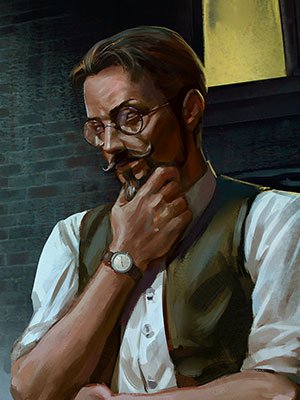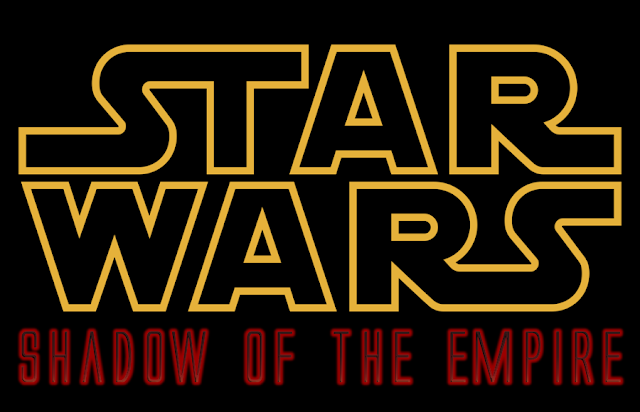Mythos 0.2
Mythos: The Dramatic Role-playing Game.
 |
| Image from FFG's Gates of Arkham |
By and by I will be presenting the role-playing system I use in my games.
A role-playing/storytelling system
The system is relatively simple and is inspired by The Window, D6 and Risus. It only uses six-sided dice.
A skill or trait are ranked in levels and they range from 1-7+.
1 Poor
2 Below Average
3 Average, Mediocre
3+ Competent
4 Above Average, Skilled, Good
4+
5 Excellent, Very Good
5+
6 Superb, Remarkable, Master
6+
7 Grandmaster, Incredible
7+ Unbelievable
Most humans have attribute/traits on a scale of 1-5. It matches the convention of rating something on a 1 to 5 scale. Thus, 1 is poor, 2 is below average, 3 is average, 4 is good or above average, while 5 is very good.
Values of 6 and 7 are there to represent characters who are significantly above the norm and while rare you do come across characters with 6 in some trait or attribute. 7 would be almost superhuman level and such an individual is truly exceptional, among the very best in the world.
The adjectives are a good gauge on how you can describe your character. For example, saying he is a very good swordsman is more telling for most people than saying he has a 5 in Swordsmanship.
From time to time the GM will ask a player to roll a number of dice to determine if you succeed or fail at some action or task. The number of dice you roll is equal to the relevant attribute or characteristic.
Typically you roll against a difficulty level. For example a challenging action is a difficulty level of 3. You roll the number of Action Dice in the relevant trait/skill in an attempt to equal or exceed the difficulty level in successes.
The number of dice you roll depend on your trait/skill. As follows, A = an Action dice, D = a Drama dice:
Action Dice (A)
1= nothing
2-5 = 1 success
6 = 2 successes
Drama Dice (D)
1 = 1 success
2-5 = 2 success
6 = 3 successes
#1 A + in your trait/skill means you roll 1 dice more than the trait/skill and discard 1 dice of the lowest value. Example, a character with a 3+ would roll 4 dice, discard 1 dice, and tally up the results on the remaining 3 dice.
Attributes of 7 and 7+ should be treated as exceedingly rare. If a character has attribute in that range or exceeding that, You should consider putting him on a different scale all together.
Difficulty levels are as follows:
2 Easy, Routine
3 Challenging, Moderate
4 Hard, Difficult
5 Very Hard, Very Difficult
6 Extremely Difficult
7 Heroic
8+ Epic
The relative number of successes tells you how well or badly you have done at the task. If you miss the difficulty level by 1 it is a partial failure. By 2 is a complete failure. If you equal the difficulty level you made it, just. If you beat it by 1 it is a good success, by 2 it is a splendid success. If you beat it by 3 it is a resounding success and your GM should allow you to narrate how well you did.
GM's note: As a rule of thumb when a character has a attribute higher than the difficulty, assume it is an automatic success and no roll required. Simply narrate that the character succeeded at the task and be done with it. E.g. Yuri is Very Strong (5), he would automatically succeed at any task with Difficulty 4 or below.
Difficulties of 10 and above should be exceedingly rare.
Opposed Tests
In an opposed contest, both parties roll their relevant attribute dice + their attribute level.
GM's note: In general, when two sides go up against each other do not resolve the conflict in just one roll. It can be a series of rolls, where each roll should be an attempt by each character to gain an edge over his opponent. Resolve it in terms of character descriptions, trading blows, dodging etc.
There are no hard and fast rules as to how the conflict should play out, you can allow the difference in successes as an advantage or disadvantage in the next round.
Drama Dice Pool
The player characters have a collective pool of dice to help them in their rolls which we call the Drama Dice pool. You gain, use and lose Drama Dice from the pool as a group and never as an individual.
A player can gain Drama Dice by exceptional role-playing in accordance with their motivations and goals in a scene. This is at the discretion of the GM and group. The Drama Dice, if any, are awarded after the scene, not during.
You also gain a Drama Dice when you fail at a task by 1 success or made it, just. It is dramatic!
Drama Dice are always gained after an action thus can never be used for the action where they are gained. Always use Dice from the existing pool.
The GM should keep a tally of Drama Dice gained during a game. They can be used as indicators for rewards and progression of the team later.
Player character's incapacitation, disappearance, demise.
If a player character is out of the game for whatever reason for the rest of the session, add 1-3 Drama Dice to the Dice pool. The amount of Drama Dice added is at the discretion of the GM and depends on how dramatic (heroic, tragic, etc) is his incapacitation or disappearance.
Using Dice from the Drama Dice Pool
You may use a Drama Dice to recover one of your trait/attribute which has been temporarily reduced due to injuries or fatigue to its full value for one scene. In order to do so, you must convincingly role-play the character's motivation to overcome his injuries/fatigue etc.
For certain actions, you can also boost your roll by over-exerting yourself. For an action or serial action you may add 1 Drama Dice to your roll then subsequently take a penalty of -1 level for that attribute for the rest of the scene or until the GM deemed you have rested sufficiently. You must declare whether you are boosting your roll before you attempt it. Typically you can only do this for strength or power based traits, and not for skills, it will be a judgement call on the GM part.
Again to highlight, any use of the Drama Dice must come with good role-playing or dramatic events. Simply declaring you wish to use the Dice will not be granted by the GM.
Character Hooks/Motivations/Calling
If you explain how an action/task ties in with your character's drivers and motivations satisfactorily to the GM you can also spend 1 Drama Dice to add to your roll. At the GM discretion, if the action or task is your main goal/archenemy/your reason for being, you may spend up to 3 Drama Dice.
Example: Gerain puts his back against the descending wall holding it up with all of his strength, and grunts through gritted teeth to his comrades,"move!"
Gerain is strong (4) but this descending wall is extremely heavy (Difficulty 9). He is behaving in a heroic manner in accordance to his calling so the GM allows Gerain to add add 1 Drama Dice from the pool to his roll. Gerain chooses to over-exert himself to boost his roll by 1 Drama Dice. So in total Gerain will roll 4 Action Dice, 2 Drama Dice.
Gerain rolls and scores 9 successes! He made it, just! After describing his success, the group gains 1 Drama Dice for rolling the exact number of successes needed to succeed and 1 Drama Dice for Gerain's heroism. This is added to the pool at the end of the scene.
Remember, Drama Dice are always awarded after the scene.
Note to the GM: This system does not attempt to simulate the real world. It does try to make things dramatic both from the players' perspectives and a third-person perspective. Some simple principles to bear in mind:
1. Only roll when it is dramatic to do so. For many actions all that is required is you compare the relevant attribute to the task at hand and decide whether the character succeeds or fails or how long it takes. Walking across a rickety bridge in a non-threatening scene does not necessitate a dice roll most of the time for most able-bodied characters. Being chased by a blood-thirsty horde of demons as you dash across the same bridge is another matter. Always think in terms of what would be dramatic from the players or audience perspective.
2. Abide by the dice rolls. Always abide by the dice rolls. It shows a sense of fairness, and mitigates part of the godlike role of the GM. It builds the sense of suspense and drama when players pick up the dice knowing their fates are literally in their hands.
3. A good story is the central goal. Both GM and players need to bear this in mind as they role-play. Always think in terms of what would make a good story and how to tell that story. There is no individual 'win'. While the GM is there to provide challenge and antagonism he is not someone to compete against. Work with him to tell a good story. A GM likewise is responsible for ensuring the players are involved and feel they have a stake in the development of the plot and the outcome of the story. You do this by making sure every player has your attention and always consider whether it is engaging or fun from their perspective. Every player is different and there is no one size fits all.
Drama Dice are a way of tilting the game towards exciting storytelling and encouraging players to take a dramatic part in it. So if a team is high on Drama Dice it is time to get them into situations where they would need to use them.
Drama Dice generally don't carry over from episode to episode. At the GM's discretion you can allow Drama Dice to be used by players to influence the development of plot lines in the story.



Comments
Post a Comment